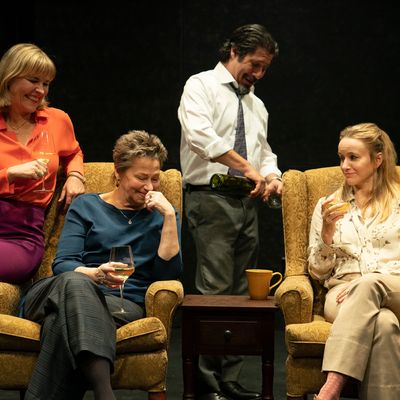
In the program note for The Thin Place, the playwright Lucas Hnath talks about his debt to his director Les Waters, who, some years ago, gave him the idea for this play. They were workshopping another text, and in conversation Waters referred to the plot needing a “thin place … where the line between this world and some other world is very thin.” Hnath wrote the phrase down, let it haunt him for a while, and eventually wrote a ghost story to fit. The resulting thriller is certainly about the supernatural, but it’s also deliberately thin, in the sense of slight. It’s a play built to seem insubstantial. Characters turn sideways, and poof, their two-dimensional portraits disappear; the whole thing is composed from layers of ontological fog. It works as a ghost story precisely because of this impermanence: You think you’ll forget it soon after you see it, but then it will just crouch there in your forgetting, waiting for your guard to drop.
Mimi Lien, structural genius and MacArthur Fellow, designed the set, so we’re automatically suspicious when there’s just a pair of yellow armchairs on an otherwise completely empty, totally unadorned stage. There’s nothing to be afraid of here, guys. With the house lights still up — nothing to hide! nothing to worry about! — Hilda (Emily Cass McDonnell) comes in with a cup of tea to chat with us. As Hilda, McDonnell has a wonderfully prim manner, and her voice has a reedy quality, like a very polite oboe. She tells us, laughing reluctantly, that she’s been seeing her grandmother everywhere. Even some of us in the audience remind Hilda of her, which she takes as a comfort in her time of constant loss. Hilda looks put-together in her beige silk shirt and slacks, but in fact her world has been spinning apart, as women dear to her are being taken away willy-nilly.
First, there was her grandmother. The two of them used to play a let’s-see-if-we’re-psychic game, in which the older woman would “send” a word or phrase to little Hilda. Hilda’s mother, who seems to have had her own obsessions and darknesses, discovered the witchy project and banished Grandma, who later died. The damage, though, was done. A door had opened up in Hilda’s brain. She tries to explain: “It’s sort of like if you were to imagine an octopus in an aquarium pressed up against glass … except that there’s no glass … and no octopus.” She has a hard time describing this place that is no-place, and her eerie super-awareness has simply left her confused and unsure — she wants to contact her grandmother, but she can’t be positive if the words manifesting in her mind come from her.
Another woman walks in and sits down. This is Linda (Randy Danson), a medium. Drawn to all things paranormal and desperate to hear from someone who could authoritatively talk to her grandmother’s spirit, Hilda has sought her out for a reading. And maybe, while she’s at it, Linda could contact her missing, possibly dead, mother? If McDonnell is an oboe, Danson’s voice — swimming in and out of a British accent — is a bassoon, deep and throbbing. It’s hypnotic: We all feel ourselves fall under her spell. With the connection to the other world established, something more physical manifests between the women. But once Hilda’s on the inside, Linda starts talking about how her “gift” actually works. It’s just structured guessing, she tells her new girlfriend. She shouldn’t be so gullible.
If Hnath — writer of A Doll’s House Part 2, The Christians, and Hillary and Clinton — is consistent about anything, it’s that in his plays, sureness is slippery. His characters tend to be caught in moments between certainties, and their doubt, even well-founded doubt, is usually destructive. Only fools are confident, and Hnath doesn’t write about fools. He writes about people who deeply and conscientiously question their beliefs — we should all try to, right? — but who accidentally rip up something valuable (a marriage, a church, a campaign) as they do so.
So, what happens when what you’re questioning is the nature of reality? Or the nature of your own supernatural gift? Between them, Hilda and Linda start tearing at the fabric of something important, and the simple stage starts growling with awful, low noises. (Sound designer Christian Frederickson isn’t always doing things we can hear, but he is doing things we can feel.) Sitting in their armchairs, tidy and civilized looking, Linda and Hilda are joined by friends Jerry (Triney Sandoval) and Sylvia (Kelly McAndrew), who want to celebrate Linda’s success at getting a visa. The currents in the room are weird; Sylvia both lusts after Linda and hates her psychic practice, and to change the mood, Hilda tells a story.
At this point, Hnath has us several Inception-levels down. We know that Hilda won’t see Linda again after this night, but it’s difficult to track who in front of us is “real” in the narrative moment and who is just a figure in Hilda’s tale. People vanish into sudden blackouts, and the night takes a darker, nearly evil turn. As in the best horror, awful things are hinted at but left unspoken. Phones ring that shouldn’t ring; shapes move in the shadows that we never see. Much of the play happens in deep red light, which has the effect of creating faint hallucinations in your peripheral vision — I can’t even really tell you confidently what happened. And that’s the elegant trick of The Thin Place. It’s a story about storytelling that defies your ability to tell a story about it. What happened? How would I know? And now imagine Hilda giving one of her wry little laughs.
The Thin Place is at Playwrights Horizons.





